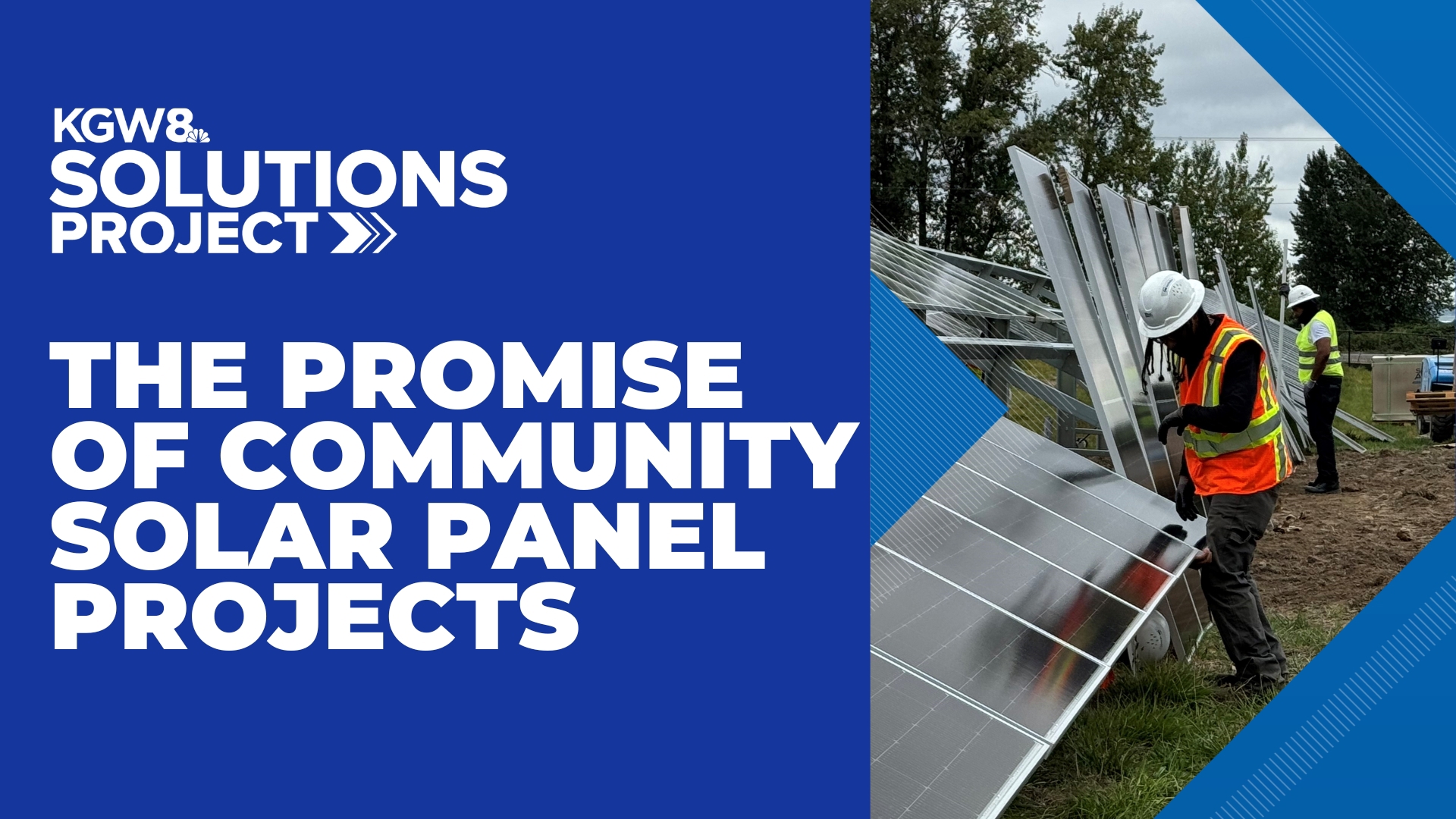PORTLAND, Ore. —
Solar panels have been converting sunlight into electricity for decades, but for many, the technology has remained out of reach.
It’s expensive to install, only realistic for homeowners and requires a roof with good sun exposure.
But a new community solar project in Northeast Portland is working to change that.
“Traditionally, if somebody wanted to be solar powered, they would have to spend 20, 30 or $40,000 to put panels on their own home,” said Evan Ramsey, director of renewables for the Bonneville Environmental Foundation. “With community solar, you can subscribe to a project without having to front the upfront capital.”
Walking among the 2,200 solar panels at PDX Community Solar, located near the Portland International Airport in Northeast Portland, Ramsey explained that projects like this one are breaking down some of those barriers.
“This particular project will be serving 150 households located in the nearby Cully neighborhood,” Ramsey said. “We've really focused on how we can apply renewable energy projects for the benefit of disadvantaged communities.”
The $4 million project is the newest — and largest — community solar project in Portland. It was primarily funded through the Portland Clean Energy Fund, a 1% tax on large businesses passed by voters in 2018.
The energy produced at the site won’t flow directly into people’s homes, though. Instead, it will be fed into the grid and will generate credits that will be applied to the electricity bills of 150 Cully residents.
Energy Trust of Oregon, a nonprofit, helped administer and certify the program. Betsy Kauffman, renewable energy manager for Energy Trust, likened it to a community garden.
“If you don't have a backyard where you can plant a garden, you can get a little piece of a garden in another location and you can grow your vegetables there — and community solar is like that,” she said. “If you don't have a roof where you can put solar, you can have a piece of a project like this and get the benefits of that solar energy as though it were on your roof.”
And the financial benefits are very real.
“The solar energy does not get delivered to their homes, but the financial benefits of the solar is delivered to their electric bill,” Kauffman said. “For people with lower incomes, it's about 40% on their electric bill.”
That translates to an annual savings of $350 to $400 a year. For many people, that kind of discount can make a profound difference.
“The Cully neighborhood is one of the most racially, ethnically diverse neighborhoods in Portland. And it also has a really large low-income population, as well,” said Sentilla Hawley, communications coordinator for the environmental justice nonprofit Verde. “If a low-income family could save up to $400 per year on their electricity bills, that would really make the world of difference.”
Hawley said the savings were so big, some folks had trouble believing they could be true.
“There were some community members who didn't really trust it, who thought that it was a scam because they could see so much savings on their electricity bill,” she said, noting that years of work in the neighborhood have helped Verde build trust among its residents.
“That's why it was really important for us to meet face-to-face with people in the community to let them know, ‘Hey, this is real, it's amazing and it's something that can happen,’” she said.
And there are other reasons Cully is an ideal spot for community solar. Research has long shown that people of color and low-income folks often suffer the worst effects of climate change, like extreme weather.
“These are the types of people who typically get hit the hardest by environmental harm,” Hawley said.
Aside from lowering bills and offsetting the use of fossil fuels, the PDX Community Solar site has also become a training ground.
Among the groups collaborating on the project is Leaders Become Legends, another local nonprofit that helps underserved community members get training in green jobs.
“We've seen a lot of the workers here be very excited to work on a project of this scale in their community that benefits people that they relate to,” Ramsey said.
While the PDX Community Solar site will be the largest in Portland, it’s far from the only one in the state. In 2016, the Oregon Legislature passed Senate Bill 1547, which called for 160 megawatts of community solar across the state.
“Currently there are 25 community solar projects that are operating, serving about 4,000 people in Oregon,” said Kauffman. “In 2025, we're expecting an additional 20 to come online.”
And there could be even more on the way, Ramsey said.
But only if it gets further support from lawmakers.
“That really depends on some policy decisions that are made,” he said. “Not every state has community solar in law. Not every utility is proactive in supporting these kinds of projects. How this scales up really depends on those policy decisions that are made.”
The KGW Solutions Project is our commitment to report on ideas and strategies that address important issues in our community. We want to hear from you about solutions. Contact us at solutions@kgw.com

